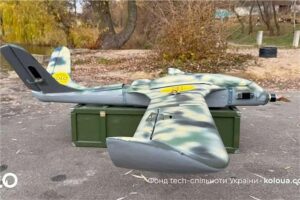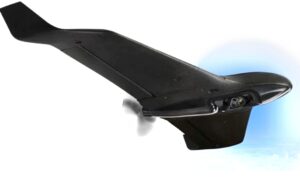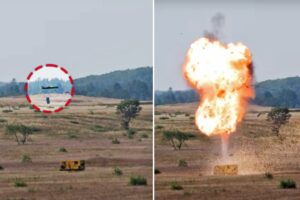New syndrome, “Drone Hysteria”! Live in fear people, live in fear.
Comment on What is the Countering CCP Drones Act, and What Does it Mean for DJI Drones? by Chinese language-Made Drones Below Scrutiny NDAA FY25 – solaosweb.com| All rights reserved.
[…] welcomed the exclusion of the Countering CCP Drones Act (CCCPD Act) from the ultimate NDAA language. The proposed laws would have eliminated DJI merchandise from the […]
Comment on Clearing the Air on New Jersey’s Drone Sightings by Pat F
In reply to William Hoffmann.
You claim he’s ignorant, so what is your drone experience, what detection systems are you using, and how, exactly, did you come to the conclusion that an accredited drone expert is ignorant because he’s not at your house?
Light show drones for rent? UVify’s new FAB rental system makes it possible
In a move set to make it even easier for teams to put on their own (huge) drone light shows, drone show leader UVify just introduced a new concept offering light show drones for rent.
It’s called the FAB (Fleet Augmentation by UVify) rental system. This model allows members of the UVify IFO network to expand their fleets on demand, enabling them to deliver larger-scale productions without the need for hefty upfront investments. Of course, you must already own some UVify drones to participate in the program.
The UVify IFO is a light show drone famously used by names including Sky Elements, which was a finalist on America’s Got Talent. UVify sells their IFO drones for just over $1,500 per unit.
Want to buy a UVify IFO drone? Mention UVify promo code DGIFO to your UVify sales representative to receive a 5% discount plus an additional free battery and set of high-performance props per IFO.
And for teams using IFO drones who are continuously seeking to break records for huge drone shows, this makes it possible — without the huge upfront cost. Some of the record-breaking drone shows made possible by UVify IFO drones include that recent Sky Elements drone show with 2,484 IFO drones creating a hummingbird in the sky for IAAPA 2024, and more recently a 5,000 drone Christmas light show (also by Sky Elements) that entailed a massive turkey and a gingerbread village. Watch that one below, right here:
How the FAB rental system works
The FAB system operates on a revenue-share model exclusive to UVify IFO network partners. Here’s how it works:
Fleet augmentation: Imagine you own a fleet of 100 UVify IFO drones but secure a contract requiring 200 drones. Instead of purchasing an additional 100 drones outright, you can rent the extra drones from UVify.
Revenue sharing: For the rented drones, the revenue from the contract is split 50-50 between the operator and UVify. Using the example above, if the contract is valued at $60,000 (at $300 per drone), the operator keeps $45,000 while paying $15,000 to UVify for renting the additional 100 drones.
Scalability: The more drones you rent, the higher the revenue share UVify collects. For instance, if you own 100 drones and need 1,000 for a show, you can rent the additional 900 from UVify, further amplifying your production capabilities.
Advantages of FAB for drone show companies
Of course, it’s likely more economical long term to just fork over the $1,500 per drone. But for drone light show companies who have landed an unusually large contract, the model can make sense. UVify’s FAB system offers several other benefits for operators:
Reduced Capital Costs: Avoid the significant investment required to purchase additional drones for one-off or sporadic large-scale events.
Flexibility: Scale your fleet based on project requirements, allowing you to accept larger contracts without logistical concerns.
Global Accessibility: UVify’s warehouses in the U.S., Europe, and soon the MENA region ensure quick and reliable access to rental drones.
The FAB rental system is an industry first and could fundamentally reshape how drone light show operators approach scalability and profitability. By enabling operators to grow their base fleets incrementally, FAB aligns UVify’s success with that of its partners.
What to know about UVify

UVify famously builds the IFO light show drones, which are built in South Korea. UVify sells a turnkey solution, where your purchase includes all hardware, software and 24/7 support. Of course, that also unlocks access to UVify’s FAB rental network.
The drones are some of the most powerful out there. Key specs include a waterproof rating of IP43, win speed resistance of up to 20 m/s (45 mph) and 26-minute flight times. The drones weigh 682 grams and their dimensions are 275x275x120 mm, which is somewhat comparable to something like the DJI Air 3S drone.
They even sell pyro drones.
Order the UVify IFO today, and don’t forget to mention UVify promo code DGIFO to your UVify sales representative to receive a 5% discount plus an additional free battery and set of high-performance props per IFO.
The post Light show drones for rent? UVify’s new FAB rental system makes it possible appeared first on The Drone Girl.
Kalashnikov Buckshot: ‘Worse Than Nothing’ Against Drones?
 New videos on Russian social media analyzed in detail at The Armourer’s Bench website provide a do-it-yourself guide for creating anti-drone buckshot rounds for the ubiquitous AK-74 assault rifle. This seems to be something of a trend, which is not surprising when infantry combat is rare and drone attacks are frequent. Ukraine has fielded more […]
New videos on Russian social media analyzed in detail at The Armourer’s Bench website provide a do-it-yourself guide for creating anti-drone buckshot rounds for the ubiquitous AK-74 assault rifle. This seems to be something of a trend, which is not surprising when infantry combat is rare and drone attacks are frequent. Ukraine has fielded more […]Ukraine’s Long-Range Taipan 100 Bomber Drone Aims to Disrupt Russian Supply Lines
 The KOLO Charitable Foundation announced* the delivery of two Taipan-100 bomber drones to Ukrainian special forces, specifically the Tymur Special Unit. This contribution, valued at $146,000, was funded through the Hurkit crowdfunding project. The equipment provided includes advanced systems designed to enhance the offensive and reconnaissance capabilities of Ukrainian operators. The Taipan-100 is a state-of-the-art […]
The KOLO Charitable Foundation announced* the delivery of two Taipan-100 bomber drones to Ukrainian special forces, specifically the Tymur Special Unit. This contribution, valued at $146,000, was funded through the Hurkit crowdfunding project. The equipment provided includes advanced systems designed to enhance the offensive and reconnaissance capabilities of Ukrainian operators. The Taipan-100 is a state-of-the-art […]AgEagle Aerial Systems Completes Order for eBee VISION Drones from Danish Ministry of Defence
 – AgEagle Aerial Systems Inc. has announced a recent expansion upon its existing eBee X drone fleet for the Danish Ministry of Defence Acquisition and Logistics Organisation (DALO) with the sale and delivery of three eBee VISION drones. AgEagle CEO Bill Irby commented, “DALO’s expansion of their existing eBee drone fleet underscores the reliability, performance, […]
– AgEagle Aerial Systems Inc. has announced a recent expansion upon its existing eBee X drone fleet for the Danish Ministry of Defence Acquisition and Logistics Organisation (DALO) with the sale and delivery of three eBee VISION drones. AgEagle CEO Bill Irby commented, “DALO’s expansion of their existing eBee drone fleet underscores the reliability, performance, […]Warheads in Phoenix Ghost Kamikaze Drones Revealed
 With its previously highly secretive Phoenix Ghost family of kamikaze drones now having emerged fully into the light, AEVEX Aerospace has been more openly discussing their capabilities. One especially interesting detail has now emerged: the different Phoenix Ghost types can be configured to launch attacks straight down while passing overhead, akin to an air-bursting artillery […]
With its previously highly secretive Phoenix Ghost family of kamikaze drones now having emerged fully into the light, AEVEX Aerospace has been more openly discussing their capabilities. One especially interesting detail has now emerged: the different Phoenix Ghost types can be configured to launch attacks straight down while passing overhead, akin to an air-bursting artillery […]de Havilland DH.82 Tiger Moth – the Biplane that Brought a Knife to a Gun Fight
 In the summer of 1940, Nazi Germany’s advance across Europe seemed unstoppable. As the once mighty France teetered on the edge of defeat after a brutal campaign, Britain braced itself for invasion. Faced with this dire threat, British High Command made a bold decision: every aircraft capable of flight would be called upon to defend […]
In the summer of 1940, Nazi Germany’s advance across Europe seemed unstoppable. As the once mighty France teetered on the edge of defeat after a brutal campaign, Britain braced itself for invasion. Faced with this dire threat, British High Command made a bold decision: every aircraft capable of flight would be called upon to defend […]No, DJI drones will not be banned in the U.S. after all
The fiscal year 2025 National Defense Authorization Act (NDAA) passed this month, solidifying funding priorities and policy directives for the United States Department of Defense. And while the sweeping legislation touches nearly every corner of U.S. defense strategy, one notable absence is making waves in the technology and business worlds: the Countering CCP Drones Act was left out of the final FY25 NDAA bill.
For months, the proposed Countering CCP Drones Act generated speculation that Chinese drone manufacturers, including the market leader DJI and competitors like Autel, might face significant restrictions or an outright ban in the U.S. The act, proposed for inclusion in the final bill, sought to ban DJI drones by adding DJI to a list of companies deemed threats to national security. If that list existed, DJI’s ability to operate within certain communication spectrums crucial for drone control would be limited.
However, the omission of this provision in the final NDAA means that DJI can freely operate and sell its drones within the U.S. For drone pilots who consider DJI to be the maker of the best camera drones, that’s a relief. But for some politicians — and perhaps some other players in the drone industry including some American drone companies — it’s not all good news. Here’s what you need to know about the FY25 NDAA in terms of drones:
Omission of Countering CCP Drones Act in FY25 NDAA squashes concern about DJI drone ban
A quick history of the Countering CCP Drones Act
Representatives Elise Stefanik (R-NY) and Mike Gallagher (R-WI) first introduced the Countering CCP Drones Act in the House in April 2023. That bill then was included in the proposed version National Defense Authorization Act (NDAA) for Fiscal Year 2025. Inclusion in that proposal was good news for supports of the bill .That’s because inclusion in the NDAA typically means bills can bypass some standard legislative hurdles and be enacted faster than usually.
But, what’s often proposed is never actually what’s in the final version. Sure, the Countering CCP Drones Act passed the House of Representatives. But, even that vote was tight, as the $883.7 billion NDAA FY25 defense bill passed only through a narrow 217 to 199 vote.
Some drone news sites (not this one) falsely reported that this meant that DJI drones were definitely banned. Alas, the bill still needed approval by the Senate before reaching the President’s desk. That brought us to the final FY25 NDAA which ended up passing the President’s desk — albeit without the inclusion of the Countering CCP Drones Act
Why was the Countering CCP Drones Act left out of the FY25 NDAA?
The omission appears to be a compromise aimed at avoiding broader economic and political repercussions. Industry groups and drone advocates warned that a ban on DJI could stifle innovation and harm small businesses that rely on affordable drone technology. That’s everything from simple small business owners who do wedding photography or real estate photography, to critical applications like agriculture or search and rescue.
Even readers of this website called their local politicians to advocate against it. (Most readers of The Drone Girl are against the ban because they fly DJI drones given their low cost and high reliability and quality).
DJI itself called out those instances.
“We want to first express our gratitude to the drone community,” DJI wrote in a statement. “Your tireless and thoughtful efforts to engage your Senators and House Representatives — sharing personal stories and explaining how anti-DJI actions would impact your businesses and operations — had a significant impact.”
Proponents of the act, however, argue that national security concerns outweigh the economic benefits, which include promoting Buy American. While the NDAA’s final language does include provisions aimed at bolstering cybersecurity and protecting sensitive infrastructure, the lack of a specific ban on DJI signals that the U.S. government is not yet ready to sever ties with the Chinese drone giant entirely.
What does this mean for Chinese drone companies like DJI and Autel?
DJI, which holds a commanding share of the global drone market, has faced growing scrutiny from U.S. lawmakers in recent years. Critics allege that DJI drones could pose security risks by transmitting sensitive data to Chinese servers. Those are claims that DJI has repeatedly denied. Despite these accusations, DJI has maintained its position as the go-to provider for hobbyists and photographers who flock to its continuously updated line of products like the DJI Neo and the DJI Air 3S. It’s just as popular among professional applications including public safety agencies who rely on its enterprise drones.
The exclusion of the Countering CCP Drones Act means that DJI can continue selling drones to American consumers and businesses without additional federal restrictions. And sure, while certain government agencies — such as the Department of Defense — have prohibited use of DJI drones due to existing security guidelines, this decision leaves the broader U.S. market open.
NDAA calls for a risk assessment of Chinese-made drones
Still, DJI and Autel aren’t totally out of the spotlight. The NDAA calls for a “risk assessment to be conducted on drones manufactured in China.”
DJI for its part has largely receptive. But it did share some concerns, including that DJI says the inclusion unfairly calls out drones made in China. From there, the FY25 NDAA does not designate a specific agency to undertake the required study.
And what’s more, if that study does not occur within a year, both DJI and Autel Robotics could be added to the FCC’s Covered List. That means that DJI would be prevented from launching new products in the U.S. market.
The larger implications of the FY25 NDAA for the drone industry
This decision to omit the Countering CCP Drones Act has significant implications for the drone industry and the broader U.S.-China tech rivalry. For one, it highlights the difficulty of balancing national security with economic interests in an increasingly interconnected world. DJI’s continued presence in the U.S. underscores the reality that Chinese-made technology remains deeply embedded in global supply chains.
Additionally, this outcome preserves the status quo for countless American businesses and consumers who rely on DJI products. From small farmers using DJI drones for crop monitoring to filmmakers capturing aerial footage, the availability of DJI technology plays a critical role in many sectors.
What comes next?
Although the Countering CCP Drones Act did not make it into the FY25 NDAA, debate over DJI’s role in the U.S. market is far from over. Lawmakers may revisit the issue in future legislation, and federal agencies could implement additional guidelines or restrictions independently of Congress.
And we have certain seen other attempts to limit or block DJI drones. Amidst Trump’s calls for greater tariffs comes the Drones First Responders Act. If passed, that Act would — from the start — create a 30% tariff on drones made in China that gradually increases until 2030. At that point, the DFR Act would outright ban the importation of drones that contain certain, critical components made in China.
Other proposals like the American Security Drone Act of 2023 wouldn’t ban drones sold to American consumers, but it would specifically prohibit federal agencies from purchasing drones made by Chinese government-linked countries.
For now, however, DJI’s position in the U.S. remains somewhat secure. Hobbyists and professionals alike can continue to purchase and fly DJI drones without fear of an imminent ban. Well, at least for the foreseeable future. Whether this marks a turning point in U.S.-China tech policy or merely a temporary reprieve, only time will tell.
The post No, DJI drones will not be banned in the U.S. after all appeared first on The Drone Girl.
